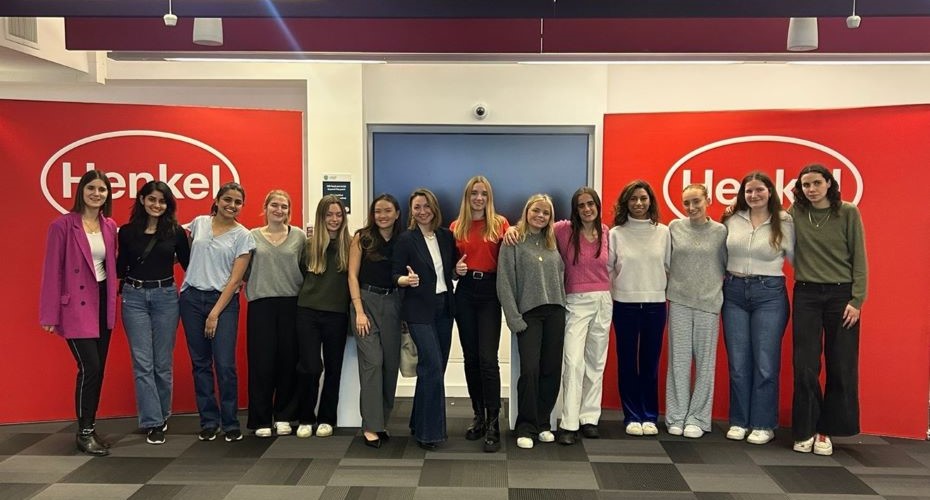Hi everyone, I’m Gowri, an MSc Digital Marketing student at the University of Exeter. Like many international students, navigating the job market in a new country was daunting initially. However, with the University’s incredible employability resources, I was able to get through this smoothly.
Over the past few months, I’ve been leveraging these resources to my full advantage and I’m here to share the knowledge and tips I’ve picked up along the way. So, grab a cuppa and join me!

University is a springboard for your future, and choosing the right institution can make a world of difference. The University of Exeter goes beyond just great academics, offering a wealth of resources to equip you with the skills and experiences employers crave.
Whether you are laser-focused on a specific career path or exploring your options and just need some support, the University has something for you.
Let’s delve into the employability resources offered by the University and a few insights from my personal journey that could help you navigate the job market a lot easier.
Resources offered by the University
Career Zone
The Career Zone at the University of Exeter is a fantastic resource dedicated to helping students and graduates achieve their career goals. Whether you’re unsure about your career path or need help with applications, the Career Zone is here to assist you.
They understand that everyone’s career journey is different. That’s why they offer tailored support based on your needs. Each year, every new or continuing student indicates their current level of career planning during registration. This helps the Career Zone provide the right support for you to decide, plan, and pursue your chosen career path.
They host regular events in the University covering topics such as:
- Creating your CV
- Interview experiences in the UK
- Writing a cover letter for postgraduates
And much more. You can find more information on all of their events here.
Handshake
Another incredible resource provided by the University is Handshake. Consider it your digital career wingman.
This career development platform allows you to create a profile aligned with your interests and search its vast database of jobs in various industries. You will then receive personalised alerts based on your preferences, ensuring you never miss out on exciting opportunities. You can apply for these jobs directly within the platform.
Additionally, Handshake also notifies you about upcoming career events at the University and nearby, and helps you explore internship opportunities.
My success story? I actually secured an internship in content marketing with a London-based company through Handshake. The process was quite simple: I submitted my CV, filled out an application form, and provided samples of my work. This experience significantly improved my chances of standing out when I was later applying for full-time positions with the company because I had already proven my potential whilst working there.
I definitely recommend doing the 10-day Handshake Challenge to amp up your profile.

University Part-Time Jobs
The University of Exeter also offers a variety of part-time job opportunities on campus. You can work as a retail assistant in the Market Place (the campus shop), work in one of the cafés, or take on roles as a digital marketing assistant or student content ambassador (just like I did). These positions not only provide extra income but also valuable work experience by equipping you with transferable skills that make you a stronger candidate post graduation.
Student Campus Partnerships (SCPs)
This is a great initiative exclusively for UK and international students at the University looking to secure paid work on campus. This scheme promotes a wide range of paid internships across the University’s campuses in Exeter and Penryn, allowing students to gain valuable experience in various fields such as research, project management, marketing, IT, and analytics.
Working in an SCP role enables you to collaborate with academic or professional services teams, further developing your skills and enhancing your employability. It can also count towards your Exeter Award!
Learn more about SCPs here.
Stay updated with the latest opportunities by joining the Student Internship Bulletin Emails, which provide weekly notifications about new internships available.
Student Business Partnerships (SBPs)
The University of Exeter’s Student Business Partnerships (SBPs) program goes beyond the walls of academia, offering a valuable opportunity for UK and international students to gain paid work experience alongside their studies, outside of the uni.
This innovative initiative isn’t just about earning an income; it’s designed to connect you with supportive employers all over the city.
Imagine securing a part-time internship at a local marketing agency, assisting with social media campaigns or content creation. Perhaps you’d thrive in a business development role, gaining insights into client relations and proposal writing. SBPs open doors to a diverse range of industries, allowing you to explore potential career paths and discover your passions.
The benefits of participating in an SBP internship are numerous. You’ll gain practical, hands-on experience that complements your academic studies. This real-world exposure allows you to apply your theoretical knowledge in a professional setting. Furthermore, SBP roles enhance your employability by equipping you with sought-after skills like communication, teamwork, problem-solving, and time management.
Staying informed about the latest SBP opportunities is easy: simply subscribe to the Student Internship Bulletin emails, sent out every Friday (use the same link attached above).
Find more information on SBPs here.
Career modules included in my course
As an MSc Digital Marketing student, I benefited from a couple of career-focused modules. One such module, Contemporary Digital Marketing Themes, included an assignment called a Reflective Portfolio, where we analysed our skills and experiences, researched the UK job market for our target roles, and completed skills assessments. This process helped us understand how our strengths aligned with career opportunities in the UK.
To further bridge the gap between theory and practice, the module lead even hosted alumni talks, giving us a real-world perspective and practical career advice from professionals already navigating the UK job market.
Additionally, if you choose the 12-month programme in this course, you get to work on two projects with real-life clients based in the UK. You develop a real marketing plan for their company with actual budgets, which is incredibly valuable. This hands-on experience helped me understand industry dynamics, client expectations, and the practical application of theoretical knowledge.
How I secured a full-time job
Like many of you might have experienced, my initial job searches also felt like a slog and daily applications yielded only rejection emails. Determined to break this cycle, I knew I needed to do more than just send out multiple applications: I had to network strategically.
I joined the University’s Women in Business Society because it most closely aligned with my passion and interest. Interestingly, a month later, they hosted an event in collaboration with Henkel, a German consumer-goods company.
I was determined to attend this (I even walked for 25 minutes in the rain to the University to there, which almost made me decide against going!). At the event, I went above and beyond just attending. I actively engaged with the employers, asking insightful questions and making sure that I left a lasting impression.
My elevator pitch landed me face-to-face time with the Head of HR, the CEO, and two project managers. I did have to go through the standard procedure of applying online (on the company website), but I made sure to tailor my CV and craft a compelling pain letter (I’ll explain more about these later in the blog), highlighting how I could address the Company’s specific needs. Three rounds of interviews (and three months of stress) later, the rain was just a distant memory and I celebrated landing my dream job as a brand marketer at Henkel!

Here are some key takeaways from my experience:
Attend University events
You never know whom you’ll meet who can help you out. University events are great for networking and making connections with industry professionals.
Talk to alumni
Alumni can be a valuable resource. I’ve found this to be particularly useful when trying to understand the market in a different country. Reach out to them, get contacts, and apply to their companies. Ask them to refer you. Their insider knowledge and connections can definitely give you an edge.
Customise your CV and write a pain letter
Tailor your CV to each role. Ditch the one-size-fits-all approach. When applying for jobs, think of your CV as a chameleon, adapting to each role and company. Highlight every skill—yes, EVERY skill—including those gained from part-time jobs as a retail assistant or a barista, as they can be highly relevant. By doing so, you make yourself a bullseye for the hiring manager!
A lesser-known (but very important) tip: Write a pain letter instead of a traditional cover letter. A pain letter addresses the company’s specific needs and shows how you can solve their problems. In fact, I picked up this hack during a career-related event hosted at the uni by the Women in Business Society again.
For example, start by identifying a key problem the company is facing. The “I’m a great fit” routine is too vanilla now. Instead, did you notice their website buried in search results? Mention it. Explain how your background, skills, and experience uniquely position you to tackle this issue. Provide specific examples of how you have successfully solved similar problems in the past. This targeted approach not only shows your initiative but also makes you stand out, much like how a well-crafted marketing strategy attracts consumers.
Showing that you went the extra mile to research the company and understand their unique challenges demonstrates your genuine interest and your proactive and solution-oriented mindset.
It’s a great way to stand out!
You can find some more tips on writing a pain letter here.
Although nobody can hand you a job on a silver platter, actively attending career evens and networking with professionals will only help you open doors that typical routes might miss. These interactions make you visible to employers.
Next steps
Go through this Employability Guide, which discuses career opportunities, study-abroad options, the Career Mentor Scheme, Knowledge-Transfer Partnership (KTP) Project, and more.
The University of Exeter offers a multitude of resources and opportunities to help you succeed in your career. Make the most of these tools, network actively, and tailor your applications to make a lasting impression. Good luck on your career journey!

